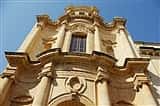Stay
Visit a locality browsing the menu on the left. In each Italy area you can then choose the best touristical structures we are proposing.
Most viewed in
Italy
-
As the smooth curves of a Mediterranean woman, who knows how to surprise and conquer, revealing, piece after piece, her wild and untamed nature, so the Amalfi coast hides inside its soul, delicate and virile at the same time, a sensuality that manifests...
-
Sunland since 1979 is the leading tour operator for ground hanling services on Amalfi Coast, Cilento and Neapolitan Riviera. Sunland is the partner of some of the biggest tour operator world wide. Our attentive staff is at your service for: Hotel accomodation...
-
The Amalfi Coast, suspended between sea and Sky, is a land of an amazing beauty. Our wish, having the pleasure to be your driver/guide, is to share with you the traditions, art, history, landscapes and the beauty that makes this land, " The Divine Amalfi...
-
Self-catering villas and apartments on the Amalfi Coast with pool, access to the sea and air conditioning. Amalfi Vacation owns and manages all the Amalfi Coast villas shown on the website. We are specialists in luxury villas and self-catering apartments...
-
Located on the famous AmalfiCoast drive, a few minutes from the famous town of Amalfi, the Santa Caterina enjoys a panoramic coastal setting of incomparable beauty. The history of this special resort is as impressive as its surroundings. In 1880, Giuseppe...
Print this page
Send to a friend by e-mail
Church of SS. Annunziata or Badia
-

The holy building, in the old town, was part of the Benedictine's monastery founded in 1532 by the lords of Avola. In the new urban spot, the whole was rebuilt in the north-west corner. The church, with its magnificent concave-convex frontage, built as from 1753, is one of the most complete and elegant examples of Baroque style buildings in Val di Noto. Desiderd by Abbess Gertrude Azzolini, can be ascribed to the architects Rosario Gagliardi and Vincenzo Sinatra, then workinh together. Since 1768 the architect Giuseppe Alessi joins the building, drawing the chorus and the altars. In 1777 the Swiss Serafino Perollo made the roccocò stuccoes. The big nave's walls stuccoes show pictures of the Cardinal Virtues. The Glory with St. Benedetto and St. Scholastica are depicted on the vault. interesting are the apintings by Costantino Carasi on the minor altars, and over the precious main altar is the SS. Annunziata's painting, adorned with incomparable Baroque golden carved frames.
(source: Avola, la città esagonale)